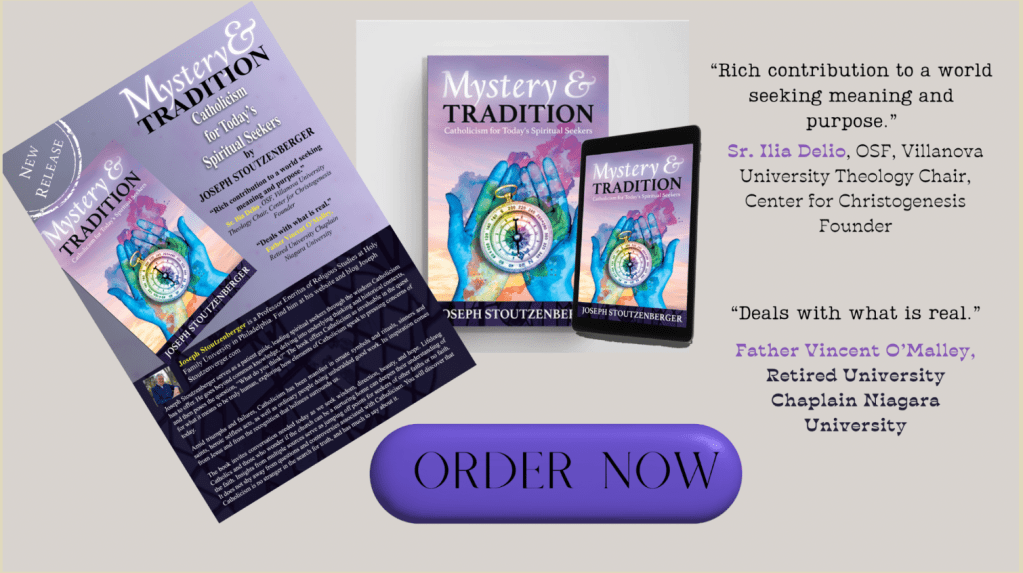by Joseph Stoutzenberger
I grew up in a small town where Catholics were scarce. One day, another Catholic boy and I were with some other boys. During the chatter among us, my Catholic friend began to curse and use foul language when describing someone he didn’t like. One of the non-Catholic boys said, “What a way to talk! And you’re Catholic!” Apparently, in his mind, Catholics were held to a higher standard of morality than other people.

The question about whether Catholicism is worth saving, addressed in my recent book – Mystery & Tradition: Catholicism for Today’s Spiritual Seekers – and in an earlier blog, lingers on. All Catholics should ask themselves that question, and it is a question for members of all religions to ask themselves. Does being Catholic make a difference in how people live their lives? Are they, in fact, held to a higher standard of behavior than others? Should they be? Karl Marx rejected Christianity because he felt it contributed to oppressed people passively putting up with their fate because its message was that their true home and happiness existed only after death. Christianity offered no incentive to be compassionate and involved in trying to make this world a better place. However, history and current examples prove that Marx’s hypothesis is wrong. Catholics often engage in practices to make this world a better place for everyone, especially for people most in need.
Admittedly, the record is mixed. As a Catholic myself, I am always pleased to hear that Catholics are on the front lines in trying to help migrants on our southern border who have endured great hardships seeking a better life. Then I read about Catholic governors who seem to lack compassion, setting up roadblocks for those fleeing inhuman circumstances in their home country and are desperate for a helping hand to get them through their ordeal. Catholics have been at the forefront of protesting against the proliferation of nuclear weapons and what used to be called the School of the Americas, where Latin American soldiers, often in the service of dictators, learned how to quash rebellions with violent means. An impressive array of Catholics also makes up a disproportionate amount of military personnel, including the current Secretary of Defense. Catholics run food pantries and shelters for homeless people, but so do members of other religions. People who identify as Catholic attend weekly services at a lower rate than non-Catholics do now, a stark reversal from what was happening sixty years ago. Catholics are well-represented among far-right political circles but also in progressive movements. In America, Catholics get divorced, practice birth control, and have abortions at about the same rate as non-Catholics do. So, what difference does being Catholic make?
One place to look for an answer is in an exchange between Jesus and “the Twelve,” who are his closest followers. After hearing particularly baffling and challenging words from Jesus, many of the people who had been following him left him and renounced his message. Jesus asks the twelve, “Do you also wish to leave me?” Peter speaks for the group, saying: “Lord, to whom can we go? You have the words of eternal life. We have come to believe and to know that you are the Holy One of God” (John 6:68). Jesus does not offer a message that is easy, either easy to understand or easy to practice. Being Catholic means nothing if divorced from faith in Jesus. Being Catholic means seeking to know the will of God and to follow it as revealed in the life and teaching of Jesus. Given the enigmatic nature of Jesus’s message, that quest is ongoing and requires constant reexamination.

That non-Catholic boy was right to say, “You’re not supposed to talk that way. You’re Catholic!” Being Catholic is supposed to make a difference, and for so many Catholics, it does. It is not a one-size-fits-all response to Jesus but a lifelong commitment to seeking truth and living accordingly in one’s particular circumstances. If you find Jesus as compelling as Peter and the Twelve did, then where else would you go for guidance in pursuit of eternal life? People of other religions or of no religion can clearly be as good and compassionate and on-target in their understanding of truth as Catholics. Other voices can inspire and offer guidance. There are many doorways into truth. Would the world really be better off if this particular doorway were closed?

Originally published on Joseph Stoutzenberger’s blog.

